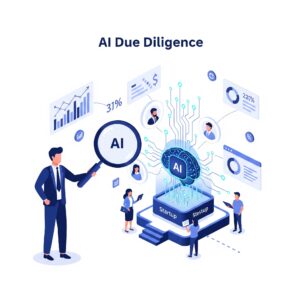 The AI Revolution in Private Markets: An Overview
The AI Revolution in Private Markets: An Overview
Private markets, particularly the early-stage ecosystem, have traditionally relied heavily on manual processes and human intuition for due diligence. Analyzing financial statements, researching market trends, and assessing the management team’s capabilities often involved extensive manual labor and subjective judgment. However, the increasing availability of data and advancements in AI technologies are changing this paradigm. AI tools offer the potential to automate and enhance various aspects of due diligence, leading to faster, more objective, and data-driven investment decisions.
Key Areas of AI Application in Private Equity Due Diligence
- Data Analysis and Pattern Recognition: AI algorithms can quickly process vast amounts of data from various sources, including financial records, market reports, social media, and news articles, to identify patterns and anomalies that might be missed by human analysts.
- Market Research and Competitive Analysis: AI can automate market research by scraping online data, analyzing competitor strategies, and identifying emerging trends. This helps investors gain a deeper understanding of the startup’s market position and growth potential.
- Risk Assessment and Fraud Detection: AI models can be trained to identify potential risks, such as financial irregularities, legal liabilities, and reputational risks, by analyzing historical data and flagging suspicious activities.
- Predictive Analytics: AI can be used to forecast future performance based on historical data and market trends, helping investors assess the potential return on investment.
- Sentiment Analysis: Natural Language Processing (NLP) techniques can analyze text data from news articles, social media, and customer reviews to gauge public sentiment towards the startup and its products or services.
The Investor’s Perspective: How AI is Enhancing Due Diligence
For investors, AI-powered due diligence offers several significant advantages. It improves the efficiency and accuracy of the due diligence process, enabling them to make more informed investment decisions with greater confidence.
Increased Efficiency and Speed
AI tools can automate many of the time-consuming tasks involved in due diligence, such as data collection, cleaning, and analysis. This allows investors to focus on more strategic aspects of the process, such as evaluating the management team and assessing the startup’s long-term vision. For instance, instead of spending weeks manually analyzing financial statements, an AI-powered platform can perform this task in a matter of hours, freeing up analysts to focus on higher-value activities.
Improved Accuracy and Objectivity
AI algorithms are less prone to human biases and errors, leading to more objective and accurate assessments. By analyzing data in a systematic and consistent manner, AI can identify potential red flags that might be overlooked by human analysts. Consider the scenario where an investor is evaluating a startup’s claims about market traction. AI can scrape publicly available data on app downloads, website traffic, and social media engagement to verify these claims and identify any discrepancies.
Deeper Insights and Predictive Capabilities
AI can uncover hidden patterns and relationships in data that would be difficult or impossible for humans to detect. This can provide investors with deeper insights into the startup’s strengths, weaknesses, opportunities, and threats. Furthermore, AI can be used to build predictive models that forecast future performance, helping investors assess the potential return on investment. For example, AI could analyze historical sales data, market trends, and competitor activities to predict the startup’s revenue growth over the next few years.
Risk Mitigation and Fraud Detection
AI algorithms can be trained to identify potential risks, such as financial irregularities, legal liabilities, and reputational risks. By analyzing historical data and flagging suspicious activities, AI can help investors mitigate risks and avoid costly mistakes. For instance, AI could scan news articles and social media posts to identify any negative publicity or controversies associated with the startup or its founders.
Examples of AI Tools Used by Investors
- Alternative Data Platforms: Companies like CB Insights, PitchBook, and Crunchbase use AI to aggregate and analyze data on startups, investors, and deals.
- Financial Analysis Tools: Platforms like Intrinio offer AI-powered tools for analyzing financial statements and identifying potential risks.
- NLP-based Sentiment Analysis: Tools like Brandwatch and Mention analyze text data from news articles, social media, and customer reviews to gauge public sentiment towards a startup.
- AI-driven Due Diligence Platforms: Several startups are developing AI-powered platforms specifically designed for due diligence, offering features such as automated data collection, risk assessment, and predictive analytics.
The Founder’s Perspective: Preparing for AI-Driven Scrutiny
For founders, the increasing use of AI in due diligence presents both challenges and opportunities. While AI scrutiny can be daunting, understanding how investors are leveraging these tools can help founders prepare more effectively and present their companies in the best possible light.
Understanding What AI is Looking For
Founders need to understand the types of data and signals that AI algorithms are trained to analyze. This includes financial metrics, market data, customer feedback, social media activity, and news coverage. By understanding these key areas, founders can proactively address potential concerns and ensure that their data is accurate and complete. For example, founders should ensure that their financial statements are properly audited and that their key performance indicators (KPIs) are clearly defined and tracked.
Optimizing Data Presentation
Founders should focus on presenting their data in a clear, concise, and easily digestible format. This includes using visualizations, such as charts and graphs, to illustrate key trends and insights. It is also important to provide context and explanations for any anomalies or outliers in the data. Consider providing a detailed explanation for any significant fluctuations in revenue or customer acquisition costs.
Building a Strong Online Presence
AI algorithms often rely on online data to assess a startup’s reputation and market traction. Founders should actively manage their online presence by creating a professional website, engaging with customers on social media, and seeking positive media coverage. It’s also crucial to address any negative reviews or complaints promptly and professionally. Building a strong and positive online reputation can significantly enhance a startup’s attractiveness to investors.
Being Transparent and Proactive
Founders should be transparent about their company’s strengths, weaknesses, opportunities, and threats. They should proactively address any potential concerns that investors might have, rather than waiting for them to be discovered through AI analysis. It’s often beneficial to prepare a comprehensive data room with all relevant information readily available to investors. Transparency builds trust and demonstrates a commitment to ethical business practices.
Leveraging AI Tools Themselves
Founders can also leverage AI tools to improve their own operations and gain a competitive advantage. This includes using AI for market research, customer relationship management, and product development. By embracing AI, founders can demonstrate their understanding of the technology and its potential to drive growth. Utilizing AI-powered analytics to identify customer churn patterns and proactively address them can be a strong selling point during due diligence.
Specific Areas Where Founders Should Focus:
- Financial Health: Ensure accurate and up-to-date financial records. Address any potential red flags proactively.
- Market Traction: Provide verifiable data on customer acquisition, retention, and engagement.
- Team Expertise: Highlight the experience and skills of the management team.
- Intellectual Property: Clearly define and protect your intellectual property rights.
- Legal Compliance: Ensure compliance with all relevant laws and regulations.
Navigating the Challenges and Ethical Considerations
While AI-powered due diligence offers numerous benefits, it also presents some challenges and ethical considerations. It is important for both investors and founders to be aware of these issues and to take steps to mitigate them.
Data Privacy and Security
AI algorithms rely on vast amounts of data, which may include sensitive personal information. It is crucial to ensure that this data is collected, stored, and processed in compliance with all relevant privacy laws and regulations, such as GDPR and CCPA. Investors and founders should implement robust security measures to protect data from unauthorized access and cyber threats. Consider using anonymization techniques to protect sensitive data and complying with all data protection regulations.
Bias and Fairness
AI algorithms can perpetuate and amplify existing biases in the data they are trained on. This can lead to unfair or discriminatory outcomes. It is important to carefully evaluate the data used to train AI models and to take steps to mitigate bias. Investors should also be aware of the potential for bias and ensure that their due diligence processes are fair and equitable. Regularly audit AI models for bias and retrain them with more diverse and representative data.
Transparency and Explainability
AI algorithms can be complex and opaque, making it difficult to understand how they arrive at their conclusions. This lack of transparency can erode trust and make it difficult to challenge or correct errors. Investors and founders should strive for transparency and explainability in their AI-powered due diligence processes. It’s important to use AI models that provide explanations for their predictions and to be able to justify the decisions made based on those predictions. Consider using Explainable AI (XAI) techniques to improve the transparency and interpretability of AI models.
The Role of Human Judgment
AI should be seen as a tool to augment human judgment, not to replace it entirely. While AI can automate many of the tasks involved in due diligence, it is still important to have human analysts review the results and apply their own expertise and intuition. Investors should avoid relying solely on AI and should always consider the broader context and qualitative factors when making investment decisions. The human element in evaluating the soft skills and adaptability of a founding team, for example, remains crucial.
The Future of AI in Private Equity Due Diligence
The adoption of AI in private equity due diligence is still in its early stages, but its potential is enormous. As AI technologies continue to evolve and data becomes more readily available, we can expect to see even more sophisticated and powerful AI-powered due diligence tools emerge. This will lead to faster, more accurate, and more data-driven investment decisions, ultimately benefiting both investors and founders.
Emerging Trends and Technologies
- Generative AI: Generative AI models, such as GPT-3, are being used to generate synthetic data, create realistic simulations, and automate content creation. This can be used to improve the quality and completeness of due diligence data.
- Graph Neural Networks (GNNs): GNNs are being used to analyze complex relationships between entities, such as companies, investors, and advisors. This can help investors identify potential conflicts of interest and assess the strength of a startup’s network.
- Federated Learning: Federated learning allows AI models to be trained on decentralized data sources without sharing the underlying data. This can help investors access more data while protecting privacy and security.
- Quantum Computing: Quantum computing has the potential to revolutionize AI by enabling the development of much faster and more powerful algorithms. This could lead to significant breakthroughs in areas such as risk assessment and predictive analytics.
The Evolving Role of Due Diligence Professionals
As AI takes on more of the routine tasks involved in due diligence, the role of human professionals will evolve. Due diligence professionals will need to develop new skills, such as data analysis, AI model evaluation, and strategic decision-making. They will also need to be able to communicate effectively with both technical and non-technical audiences. The future of due diligence will be a collaborative effort between humans and AI, with humans focusing on the more strategic and creative aspects of the process. Professionals who can effectively interpret and validate AI insights will be highly valued.
In conclusion, AI is rapidly transforming the landscape of private markets, particularly in the early-stage ecosystem. By understanding how investors are leveraging AI for due diligence, founders can better prepare themselves for scrutiny and optimize their data presentation. While challenges and ethical considerations exist, the potential benefits of AI-powered due diligence are significant. Embracing this technology and adapting to its evolving role is crucial for both investors and founders seeking success in the modern private equity landscape.


